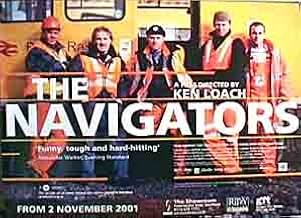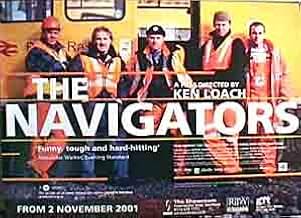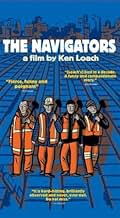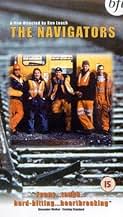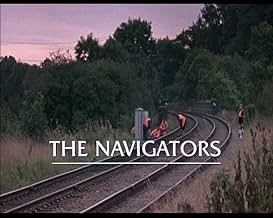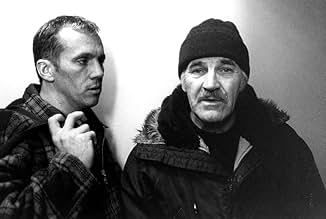The Navigators
- 2001
- Tous publics
- 1h 36min
NOTE IMDb
6,9/10
3,2 k
MA NOTE
Cinq hommes du Yorkshire tentent de survivre après la privatisation de British Rail.Cinq hommes du Yorkshire tentent de survivre après la privatisation de British Rail.Cinq hommes du Yorkshire tentent de survivre après la privatisation de British Rail.
- Réalisation
- Scénario
- Casting principal
- Victoire aux 1 BAFTA Award
- 3 victoires et 3 nominations au total
Thomas Craig
- Mick
- (as Tom Craig)
Angela Forrest
- Tracy
- (as Angela Saville)
Avis à la une
Saying frankly, I did not enjoy, nor being moved by the movie. The story is neither dramatic nor exciting. The lead character is not well defined and thus easy to confuse the audience. After watching it, being little bit disappointed, I went out to walk my dog, but the movie occupied my thought even after I came home. This is a story in railway workers in the UK, however I could see similar situation in Japan too. In Japan, many companies are gradually recovering from serious downfall. But during the process of profit recovery, companies have replaced fixed-cost employees by variable cost contract workers. As a result, the lifetime employment system has collapsed, and the power of the unions, the members of which are employees only, have been eroding. At the same time, number of contract workers, who do not have systematic training and skills building, has increased. In this trend the gap between peoples of high wages and low wages are becoming wider. British society has been many years the forerunner in the world of winning the rights of workers. But these rights are now too easily forgotten under the pressure of global economy. This is a social crisis in longer term. At least this movie has succeeded to portray this crisis.
I was lucky to see during the festival of Venice in Milan this very recent film from the good "social" director Ken Loach.
A group of friends in 1995 work in the Yorkshire for the ex-state owned: British Rail, which meanwhile has been completely fragmented in a tremendous number of small private companies that compete one against the other in order to be more competitive and gain the different bids. This situation leads the whole structure of each private company to a very profitable organisation offering a very poor service that has to save money from any single item of the fixed/variable costs structure of the economic statement.
Loach this time points out the lost of the social benefits of the labour class in a blackmail black and white situation where, if they want to get the job, they have to leave with these conditions which do not guarantee any type of social and physical safety to the worker.
It is not by chance that England has been the frame of several train accidents during the last years.
Unions are getting weaker and weaker and the so called "trouble makers" are led to leave the companies. The whole film is nicely viewed with some very fine, pretty uncommon in previous Loach's films, British humour. The scene where the supervisor has to read to the workers the message from the top management of productivity and their new rights is hilarious and superbly performed.
Rating: 6/10
A group of friends in 1995 work in the Yorkshire for the ex-state owned: British Rail, which meanwhile has been completely fragmented in a tremendous number of small private companies that compete one against the other in order to be more competitive and gain the different bids. This situation leads the whole structure of each private company to a very profitable organisation offering a very poor service that has to save money from any single item of the fixed/variable costs structure of the economic statement.
Loach this time points out the lost of the social benefits of the labour class in a blackmail black and white situation where, if they want to get the job, they have to leave with these conditions which do not guarantee any type of social and physical safety to the worker.
It is not by chance that England has been the frame of several train accidents during the last years.
Unions are getting weaker and weaker and the so called "trouble makers" are led to leave the companies. The whole film is nicely viewed with some very fine, pretty uncommon in previous Loach's films, British humour. The scene where the supervisor has to read to the workers the message from the top management of productivity and their new rights is hilarious and superbly performed.
Rating: 6/10
As always, a social issue is beautifully intertwined with personal drama: sad, funny, true like life itself. And cinema itself. It's a relief to see someone can entertain and move us in this way, that's definitely not the present-day Hollywood way. On the other hand, Loach's career is brilliant from beginning to end with the only possible exception of Carla's Song that I consider a faux-pas. Like all great artists, Loach with this films add something to our understanding of ourselves, and our present history. I supposed that you understood I liked it. Still it seems I've lost the best: the liverpuldian parley. In Italy unfortunately all these films come dubbed.
Marvelous film set in South Yorkshire, using local actors and comedians, done not so much in a documentary style, but with a documentary feel, about a group of railroad track workers during the privatization of British Rail. The culture changing from one of unionized steady jobs, to one of freelancing with no health care or holidays and for the sake of economy, stretching security which leads to the death of one of the workers. This presumably low budget film, shot all on location, is gritty, real, and is a wonderful insight into the British working class and its humor. A real treasure.
The fact that the previous reviewer apparently had other problems on her mind at the time should not dissuade anyone from seeing this excellent example of Ken Loach's work.
The fact that the previous reviewer apparently had other problems on her mind at the time should not dissuade anyone from seeing this excellent example of Ken Loach's work.
England. Mid 1990's. British Rail has been privatised and broken up into separate companies with all work put out to tender with the lowest bidder getting the job. This film follows a group of workers in a Yorkshire depot as the culture gradually changes from a world of union influence into a competitive business world.
This is a very sobering film - it deals with the railtrack situation but is more generally about the selling out of the working man and the beginning of the culture that views people as commodities and expenses, just like the rolling stock and the rails. The film opens with the boss of the depot announcing that the company has been privatised and that things will begin to change. It then follows the culture change over the course of time and concludes with a depressingly innocuous exchange that represents the shattering of previously unified spirits.
The culture change beings with mission statements, competing with work and setting levels for "acceptable deaths and continues with an end to previous agreements and a range of different companies. It is very hard to watch without being angry at the treatment of previously proud men as they are reduced to being costs. Workers are offered voluntary redundancy and those that refuse are gradually forced out. Bosses and chief execs identify those workers that have union ties and work to push them out. Workers are encouraged to join temp agencies at higher wages but without benefits or a steady work load thus saving the company money. Those that make trouble with the crews by insisting on safe working conditions etc are blackballed by the agencies and no more work is put their way. The pressure to cut costs to win jobs continues until unskilled workers are used for rail maintenance because they are paid cash in hand while other crews are forced to use "cost-effective" methods to work without a lookout and run the risk of severe accidents.
For those who think that the experiences of the workers are exaggerated for effect, Ken Loach received regular visits from railtrack workers (taking holidays or sick days) to advise on the film to make sure that it was representative of their experiences - they couldn't officially do it as they feared being blacklisted within the company. These things do go on - the rail companies are led by bosses who get huge bonuses from the shareholders as they drive down operating costs by compromising safety and reducing the workforce costs.
If the film has a major flaw it is the one-sided nature of the script. Workers are all represented as jovial, hardworking types, you know - salt of the earth, put down by bosses who only care about money. The latter may well be true but the way the workers constantly joke etc makes them look too good and the film has far too much sympathy for them for it's own good. Even when a group of workers do something completely abhorrent (the end of the film) it is presented as something that they had no choice about whereas really they should have carried some of the blame.
This film was released in Europe but only had a limited release in the UK as it was screened first on TV. It came shortly after the collapse of Railtrack as the Government put it into administration. It was screened days after the Government tried to cover up a report of failing train performances etc and it was screened as inquiries continue into serious derailments with significant loss of life.
In the UK one major accident killed many passengers and was put down to badly maintained rails. The Chief Exec has thus far escaped charges of manslaughter (despite the findings of the Health & Safety Executive) and also left his job with his huge contractually-obliged bonus, before moving on to another job on another board. For those who think that this film is exaggerated you truly have no idea what's going on in the world of big business.
As the Government continue plans for part privatisation of the London Underground and have further plans to privatise air traffic control this film is a very scary thing. Once we forget the people who make up workforces that only leave numbers. When shareholders become more important than the public and the workers then costs are all that matters and all corners are cut to boost the share price.
This film has it's flaws and will not change Government policy one bit. But this is a very sobering film that will open you eyes to what is done to satisfy shareholders and earn bonuses for upper management.
This is a very sobering film - it deals with the railtrack situation but is more generally about the selling out of the working man and the beginning of the culture that views people as commodities and expenses, just like the rolling stock and the rails. The film opens with the boss of the depot announcing that the company has been privatised and that things will begin to change. It then follows the culture change over the course of time and concludes with a depressingly innocuous exchange that represents the shattering of previously unified spirits.
The culture change beings with mission statements, competing with work and setting levels for "acceptable deaths and continues with an end to previous agreements and a range of different companies. It is very hard to watch without being angry at the treatment of previously proud men as they are reduced to being costs. Workers are offered voluntary redundancy and those that refuse are gradually forced out. Bosses and chief execs identify those workers that have union ties and work to push them out. Workers are encouraged to join temp agencies at higher wages but without benefits or a steady work load thus saving the company money. Those that make trouble with the crews by insisting on safe working conditions etc are blackballed by the agencies and no more work is put their way. The pressure to cut costs to win jobs continues until unskilled workers are used for rail maintenance because they are paid cash in hand while other crews are forced to use "cost-effective" methods to work without a lookout and run the risk of severe accidents.
For those who think that the experiences of the workers are exaggerated for effect, Ken Loach received regular visits from railtrack workers (taking holidays or sick days) to advise on the film to make sure that it was representative of their experiences - they couldn't officially do it as they feared being blacklisted within the company. These things do go on - the rail companies are led by bosses who get huge bonuses from the shareholders as they drive down operating costs by compromising safety and reducing the workforce costs.
If the film has a major flaw it is the one-sided nature of the script. Workers are all represented as jovial, hardworking types, you know - salt of the earth, put down by bosses who only care about money. The latter may well be true but the way the workers constantly joke etc makes them look too good and the film has far too much sympathy for them for it's own good. Even when a group of workers do something completely abhorrent (the end of the film) it is presented as something that they had no choice about whereas really they should have carried some of the blame.
This film was released in Europe but only had a limited release in the UK as it was screened first on TV. It came shortly after the collapse of Railtrack as the Government put it into administration. It was screened days after the Government tried to cover up a report of failing train performances etc and it was screened as inquiries continue into serious derailments with significant loss of life.
In the UK one major accident killed many passengers and was put down to badly maintained rails. The Chief Exec has thus far escaped charges of manslaughter (despite the findings of the Health & Safety Executive) and also left his job with his huge contractually-obliged bonus, before moving on to another job on another board. For those who think that this film is exaggerated you truly have no idea what's going on in the world of big business.
As the Government continue plans for part privatisation of the London Underground and have further plans to privatise air traffic control this film is a very scary thing. Once we forget the people who make up workforces that only leave numbers. When shareholders become more important than the public and the workers then costs are all that matters and all corners are cut to boost the share price.
This film has it's flaws and will not change Government policy one bit. But this is a very sobering film that will open you eyes to what is done to satisfy shareholders and earn bonuses for upper management.
Le saviez-vous
- GaffesThe vest that John wears in the beginning (with the meter) and end (their last job), is actually a British Rail safety vest, over his Gilchrist coat (when he moves you can see the gray on it). He has the combination on before the company is renamed Gilchrist Engineering.
- ConnexionsReferenced in Il était une fois...: Moi, Daniel Blake (2021)
Meilleurs choix
Connectez-vous pour évaluer et suivre la liste de favoris afin de recevoir des recommandations personnalisées
- How long is The Navigators?Alimenté par Alexa
Détails
- Date de sortie
- Pays d’origine
- Sites officiels
- Langue
- Aussi connu sous le nom de
- Demiryolcular
- Lieux de tournage
- Sociétés de production
- Voir plus de crédits d'entreprise sur IMDbPro
Box-office
- Montant brut aux États-Unis et au Canada
- 3 052 $US
- Week-end de sortie aux États-Unis et au Canada
- 1 940 $US
- 23 févr. 2003
- Montant brut mondial
- 1 807 686 $US
- Durée1 heure 36 minutes
- Couleur
- Mixage
- Rapport de forme
- 1.85 : 1
Contribuer à cette page
Suggérer une modification ou ajouter du contenu manquant

Lacune principale
By what name was The Navigators (2001) officially released in Canada in English?
Répondre
